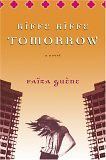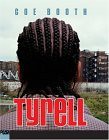Kirsten Miller (aka the author of the most awesome Kiki Strike commented yesterday, but left no way to get in touch... so Kirsten, if you're reading this, I'm an adult medium. I'm also going to see if I can email you via Bloomsbury.
I'm trying to catch up on reviews. I'm seriously about 85 books behind. One of my new year's resolutions last year was "Be a Better Blogger". I think I was but this next year, it's going to be "Review at least 5 books a week or stay current with reading". So y'all have that to look forward to. Marie's been complaining about my lack of reviews and therefore her lack of new books to look for.
So... here are two tales of ghetto life, one of which is awesome, and one of which is not so much.
I read Kiffe Kiffe Tomorrowby Faiza Guene based on this post at Lotus Reads. In this deceptively easy read, Doria is a French teenager of Moroccan descent living in Paradise Gardens-- a Parisian suburban ghetto. Sick of school, sick of the stream of social workers coming to the house, sick of her gossip-y neighbors, Doria's main outlook on life is "kif kif tomorrow" which she translates as "same old shit tomorrow". The chapters are short, the style is as if a 15-year-old girl were just talking at you and it works really well. If you don't want to , you won't notice the stark and dismal portrait of life for Arab immigrants to France. But this is still a great book, not only for the protrayal of Parisian ghetto life, but also because it's a remarkable story of Doria's coming-of-age and can be enjoyed on many levels. I highly recommend.
Tyrell, by Coe Booth, doesn't work nearly as well. This is also written in the voice of a teenager living in the projects of the Bronx. Except that his mom gets evicted and they (along with his younger brother) need to navigate the city's homeless system. Tyrell's dream is to get back into the projects. Booth grew up and lives in the Bronx and was a social worker there for a long time. I don't doubt the book's voice, or the authenticity of the story. What rankles me is the over reliance on stereotypes, the flatness of many of the characters, and a distrubingly misogynistic tone. There was not 1 decent woman in the whole book. Not 1!
Tomorrow, I leave for Christmas down Texas way. I'm already thinking about what books to bring. I plan on catching up on lots of reading. Lots of books!



3 comments:
I have to disagree with your assessment of Tyrell. I didn't find it at all misogynistic - I did find it realistic and sometimes depressingly so. I’m not sure how you define “decent”, but I found Novisha and Jasmine interesting, complicated and authentic young women – dealing with life the best way they know how. As for Tyrell’s mother, she may not be a good mother, but she is another character grasping at whatever is available to her. Tyrell may not be a pretty picture but it is a powerful story of teens, adults and families struggling with poverty – an all too real crisis in our country. These are people who are barely getting by (or not at all), using all the resources they can and walking a very thin line. It’s raw and gritty but not at all stereotypical.
Hi There,
Adult medium it is! You can send your address to kikistrike@gmail.com.
Kirsten Miller
Let me say, I know I am in the minority when it comes to my opinions on Tyrell. Everyone else seems to loooooove it, including my hero, David Levithan.
Novisha and Jasmine might have been interesting, complicated, and authentic, but I didn't find either of them overly positive. Novisha's dishonesty bothered me, and she came off as a bit spineless. More than anything, she just annoyed me. Jasmine really bothered me, especially her use of sex as means of manipulation. If she had been a guy, and Tyrell a girl, her behavoir would have been completely unacceptable. Tyrell's mom may have been grasping at whatever is available, but when that includes refusing to look for a job, drinking, taking drugs, and abusing her children? I don't have to, and I won't respect that.
You might not find it sterotypical, but I do. Tyrell's story is exactly what people in small-town white middle America think urban black life is like. I was expecting something less predictable from someone like Booth.
Post a Comment